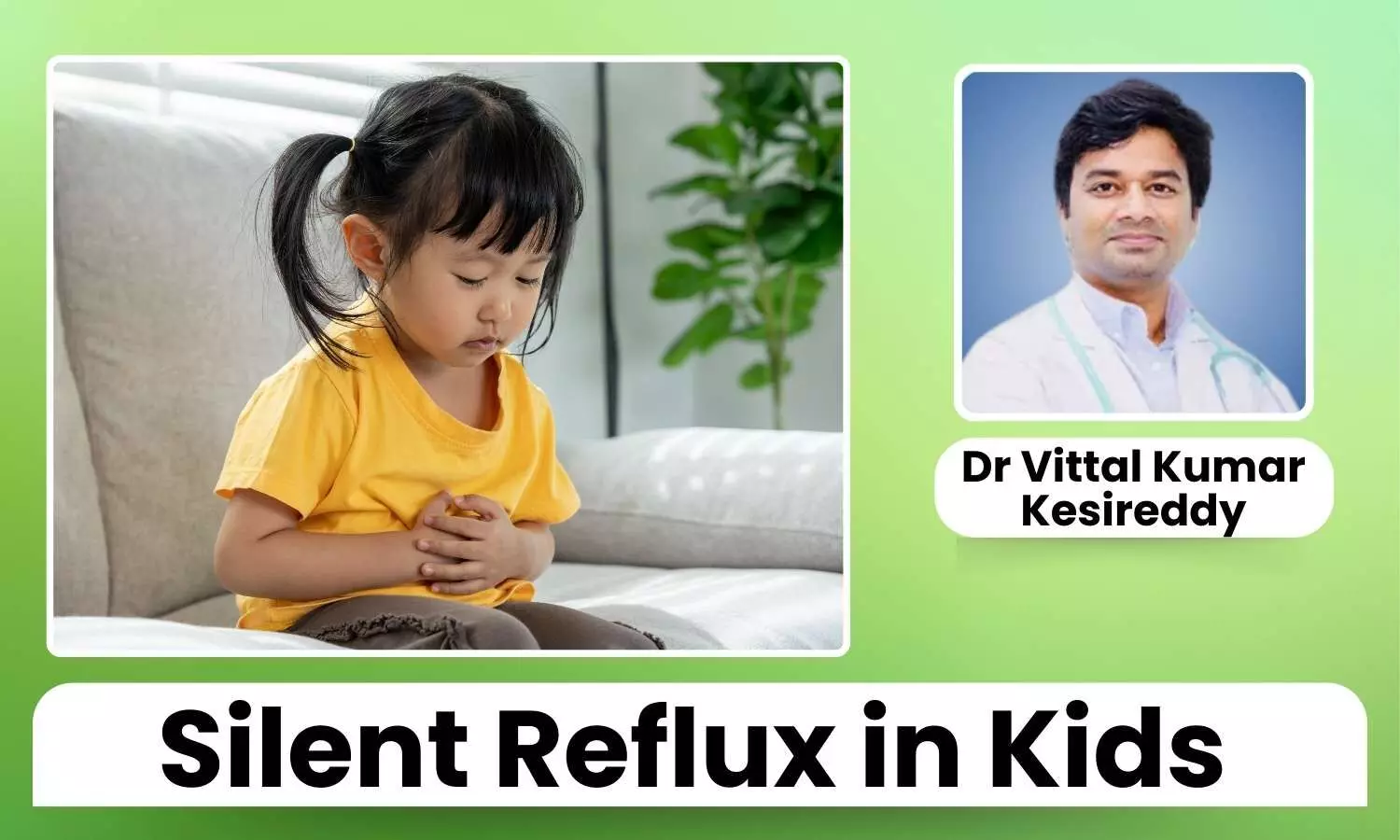Silent Reflux in Kids: Forgotten Reason for Constant Cough and Sleep Problems - Dr Vittal Kumar Kesireddy

Allergies, colds, and asthma are common things that we look for when a child has a cough that won't go away or trouble sleeping at night. But what if the real problem isn't so obvious? What if it doesn't even cause the heartburn symptoms we usually connect with reflux?
Silent reflux, also called laryngopharyngeal reflux (LPR), is a problem that kids may not realize they have but can make them cough all the time, have trouble breathing, and have trouble sleeping.
Heartburn and vomiting are signs of gastroesophageal reflux disease (GERD). Silent reflux, on the other hand, doesn't always cause pain, which makes it harder to identify.
What does Silent Reflux Mean?
When stomach acid runs back up the oesophagus and into the throat and voice box (larynx), this is called silent reflux.
For babies and kids, this acid can irritate soft tissues, causing long-lasting complaints that don't seem to have anything to do with digestion. Young children may not be able to explain how they feel, so silent reflux is often missed or given the wrong name.
Signs that a Child has Silent Reflux
Unlike regular reflux, silent reflux doesn't always make you spit up or look like you're in pain. Instead, it might cause signs like:
- A cough that won't go away even when you take allergy or antibiotic medicine.
- A hoarse voice or clearing your throat a lot.
- Stridor or hacking is a noisy way of breathing.
- Ear infections that keep coming back because acid gets into the ear tubes.
- Having trouble eating or frequently choking or gagging.
- Problems with sleeping, like waking up often and being restless.
- Apnoea-like events where you stop breathing for a short time.
Because these symptoms look like those of breathing problems like asthma or infections, kids with silent reflux are often given treatments that aren't needed while the real problem stays unfixed.
Why is Silent Reflux Often Missed?
There are a number of reasons why quiet reflux is not always found:
Heartburn symptoms: Since silent reflux doesn't always hurt, parents and doctors might not think that headaches that won't go away or trouble sleeping are caused by reflux.
Cross-over with other conditions: Many of the signs of silent reflux look like those of asthma, allergies, or sinus infections, which can lead to the wrong diagnosis.
Children have trouble expressing their symptoms. For example, young children may not be able to describe how they feel, like having a sore throat, which makes it harder to figure out if reflux is the cause.
How Sleep is affected by Silent Reflux?
One of the most common effects of silent indigestion that people don't think about is trouble sleeping. When acid gets to the throat, it can irritate it, which can make you wake up often, cough, and even have trouble breathing at night. Reflux can set off an infant's startle response, waking them up quickly and messing up their sleep cycles.
For older kids, silent reflux that isn't treated can lead to chronic tiredness, trouble focusing, and behaviour problems that are sometimes wrongly thought to be caused by ADHD or anxiety.
Silent Reflux: How to Tell
If your kid has symptoms that don't go away, a doctor may suggest:
- A test of medicine that lowers acid to see if symptoms get better.
- pH tracking to find out how much acid is in the throat.
- A small camera is used during laryngoscopy to look for signs of discomfort in the throat.
- Taking out things that cause symptoms to see if diet plays a role in symptoms.
How to Deal with and Treat Silent Reflux
The good news is that silent reflux can usually be controlled by making changes to your food and lifestyle and, in some cases, by taking medicine.
1. Changes to the diet
Cut back on foods that are spicy or acidic, like tomatoes, chocolate, fried foods, and fizzy drinks. Instead of big meals, serve smaller ones more often. Don't feed your baby right before bed; wait at least two hours before lying down.
2. Changes to your lifestyle
After eating, keep babies standing up for 20 to 30 minutes. For bigger kids, raise the head of the bed a little to stop acid from flowing up. To keep from taking too much air, teach people to eat slowly and properly.
3. Medicines (if You Need Them)
Doctors may sometimes give acid-lowering drugs, such as proton pump inhibitors (PPIs) or H2 blockers, to lower stomach acid and help the body heal.
Why Being Aware Is Important
Many people don't know how common silent reflux is, and getting it checked out early can help avoid long-term problems like sore throats, damaged vocal cords, and trouble sleeping.
If a child has trouble sleeping, coughs all the time, or has breathing problems that can't be explained, silent reflux might be the reason. If you rule it out, the child might feel better faster and have a better quality of life.
Parents and doctors who know how to spot the mild signs of silent reflux can make sure that kids get the right care and don't get antibiotics or asthma medicines they don't need. If a child has a cough that won't go away, you might want to ask: Could it be a silent reflux?


